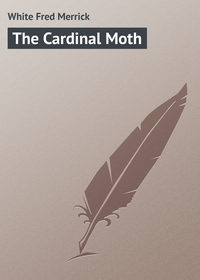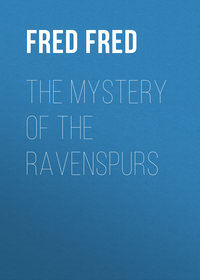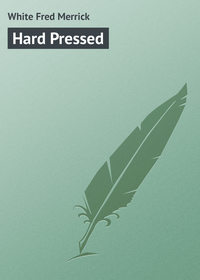 полная версия
полная версияThe Weight of the Crown
An hour ago and the game was as good as won. Everything had been done so secretly; nobody guessed anything. Another day, and nothing could save the crown in question. And yet in a moment the whole dream had been shattered. Somebody knew exactly what was going on, somebody was at work to checkmate the dark design. And that somebody was bold and daring to a degree. If the countess only knew who the other woman was! It was maddening to work in the dark against so clever a foe. If your enemy knows you and you don't know your enemy, he has a tremendous advantage. The countess clenched her teeth together viciously as she thought of it.
The carriage stopped at length outside the Carlton Hotel, and almost immediately Hunt, the editor of the Evening Mercury, appeared. He looked uneasy and anxious.
"Your message came all right," he said. "I came here at once and ordered supper, though we shall not have much time to talk."
"Then let us go into the room at once," the countess said; "though as to appetite, why – "
"But I ordered the supper in a private room," Hunt protested. "One never knows what people may hear. What is the use of arguing? The supper is all ready for us."
They were in the private room at length. They made some pretence of eating and drinking till the two waiters had for the time being departed. Then Hunt turned to his companion.
"What has happened?" he asked. There was nothing of deference in his manner. It was quite evident that the smart little American editor was no squire of dames. "Your manner was so mysterious. And it is time you did something for your money. Two thousand pounds is a deal to pay for – "
"Such information as I have already given you?" the countess interrupted. "I don't think so, seeing what a tremendous sensation you secured to-night."
"But those other papers," Hunt protested. "You promised me the full details of that private understanding between England and Asturia. I have told my readers boldly that they shall have it in the morning issue of my paper to-morrow morning. If you want the extra money – "
"Man, I want it as an old man wants youth. It is vitally necessary to me. And can't you see that it is to my interest that those papers should be published to the world? It will be a staggering blow to England, and a corresponding advantage to Russia. I should have seen that those papers saw the light whether I was paid for them or not. But they are worth a great deal to you, and that is why I approached you in the matter."
"Yes, yes," Hunt said impatiently. "Please get on. I came here to receive those papers – in fact, the Mercury is waiting for them at this moment. If you will hand them over to me you shall have the other cheque for five thousand posted to you to-night. Where are they?"
The countess laughed derisively. There was a gleam of wild fury in her dark eyes.
"It is impossible," she said. "Out of the question. Strange as it may seem, those papers were stolen from my house to-night by some woman whom I would give five years of my life to know."
CHAPTER XV
THE SEARCH
Hunt's expression was not polite, nor was it intended for ears feminine. His almost eager face fell; he was evidently thinking of nothing else but his paper. He would have ruined every kingdom in the universe, including the State that gave him birth, to get a scoop on his rivals. Just for a moment it flashed across his mind that he had been betrayed for higher money.
But that was hardly possible. No English paper would have dared to give that information to the world. It would have aroused the indignation of every patriotic Briton, and the circulation of even the yellowest in the world would have suffered. And the expression of the countess's face was no acting.
"It seems almost incredible," Hunt said. "Please tell me all about it."
The countess proceeded to relate the story. It seemed to him that the case was not quite hopeless after all. True, he would not be able to enjoy the prospective triumph of his paper over the others, but as an able and adroit journalist he would know how to get out of the difficulty.
"Well, you have a clue anyway," he said. "Miss Galloway is a strikingly beautiful girl, with a very marked type of loveliness, and if the thief was so like her as to make your maid certain that Miss Galloway was the real thief, the culprit is not far to seek. You don't think yourself – "
"That Vera Galloway is the thief? Of course not. The thing is physically impossible. Besides, Vera Galloway does not take the slightest interest in politics. She is quite a butterfly. And yet the whole thing is very strange. What puzzles me most is the infinite acquaintance the thief appears to have with my house. She could not have walked in like that to my bedroom unless she had a fine knowledge of the geography of the place."
"I'll make a stirring half column of it," Hunt said – "showing no connection between your loss and that Asturian business, of course. We'll hint that the papers were stolen by somebody who fancied that she had a claim on your vast Russian estates. See what I mean. And we'll make fun of the fact that your maid recognized Miss Galloway as the culprit. That will set people talking. We'll offer a reward of £100 for a person who first finds the prototype of Miss Galloway. See? Unless I'm greatly mistaken, we shall precious soon get to the bottom of this business."
The countess nodded and smiled approvingly. The cunning little scheme appealed to her. She pushed her plate and glass away with which she had been toying. At the same moment a waiter came and handed her a note, which she opened and read with a flushed face.
"It appears as if the police had actually succeeded in doing something for once," she said. "This is from one of the Scotland Yard men, saying that a woman in black dress and veil, answering to the description given by Annette, has been taken to Charing Cross Hospital after being knocked down by a passing cab. This may or may not mean anything, but it is distinctly encouraging. I am told that I shall know more in the morning. But that is not good enough for me."
"Don't do anything impetuous," Hunt said anxiously.
"I am not in the habit of doing impulsive things," the countess replied. "At the same time, I am going to Charing Cross Hospital to-night to make sure. It is quite time we finished this discussion, as you have to alter your plans and write that paragraph. Let us be going."
A little later and the countess was proceeding in her brougham eastwards. Hunt had parted from Lechmere, too, after the latter had derived his useful piece of information from the startled editor. But the countess did not know anything of that. And as she was approaching the well-known hospital, Jessie Harcourt was reaching it in another direction in the motor-car of Lascelles, otherwise known as "Pongo." The nearer she approached to her destination the more nervous did the girl become.
"Awfully jolly ride," Lascelles grinned. "Glad you put that black thing over your head, though. It's a pity to cut the thing short, but I suppose the joke has gone far enough?"
"Not quite," Jessie said between her teeth. "I am going to confide in you, Mr. Lascelles – "
"Called me 'Pongo' just now," the other said in tones of deep reproach. "It seems to me – "
"Well, Pongo, then – dear Pongo, if you like," Jessie said desperately. "I am going to confide in you. I want you to put me down close to the hospital, and then you go back without me. You may infer that I did not care for the business, and that I returned home by the front door. Then at the end of half an hour or so, you are to declare that the sport is over for the night and ride off as if seeking your chauffeur. After that you are to come here and fetch me back. You understand?"
It was quite plain, from the blank expression of Lascelles' face, that he did not understand. The familiar air had left him; he had grown stiff and almost stern.
"I don't quite follow," he said. "Of course, if I choose to play the ass – which, by the way, I am getting a little tired of – why, that hurts nobody. But when a lady who I respect and admire asks me to become a party, don't you know, to what looks like some – er – vulgar assignation – "
"You are wrong," Jessie cried. "You are a gentleman; you have more sense than I expected. I pledge you my word of honour that this is no assignation. It is a case of life and death, a desperate case. I am going into the hospital; it is important that nobody should know of my visit – none of my own friends, I mean. I could come back in a hansom, but danger lies that way. I have no money for one thing. Mr. Lascelles, please believe that I am telling the truth."
The girl's troubled eyes turned on the listener's face. Lascelles would have been less than a man had he not yielded, sorely against his judgment as it was.
"I'll do it," he said. "No woman ever yet appealed to me in vain. Because I play the ass people think that I don't notice things, but they are mistaken. I've never done anything yet to be ashamed of, anyway. And I'm not going to begin now. It seems to me that you are making a great sacrifice for somebody else. If I could feel quite sure that that somebody else was a – "
"Woman? It is a woman! I felt quite sure that I could rely upon you. Now please go back and act exactly as I have suggested. When you come to know the truth – as assuredly you shall some day – I am quite certain that you will never repent what you are doing to-night."
Lascelles was equally certain of it. He was quite convinced now that he was no party to anything wrong. All the same, his face was very grave as he helped Jessie from the car, and placed her wrap more carefully around her. It was a long black wrap, covering her head and face and reaching to the ground, so that the girl's rich dress was quite hidden.
"Half an hour," Jessie whispered. "It may be a little longer. I can trust your discretion. At first I was a little afraid that perhaps you might – but in your new character you are quite reliable. Do not stay any longer or we shall attract attention."
Lascelles wheeled his car round and started westward once more. Jessie hesitated just a minute to make quite sure that she had her permit in her pocket, when a two-horse brougham dashed up. Evidently some fashionable doctor summoned in a hurry, Jessie thought. But when she looked again at the perfectly appointed equipage, with its fine horses and its silver harness, she knew better. The thing was too fashionable and glittering for a doctor; besides, no man in the profession would use such a turn-out at night. Then, as Jessie looked again, her heart beat more violently as she recognized the face of the occupant. It was the Countess Saens. What did she want at this hour of the night? No errand of mercy, Jessie felt quite sure, for the Countess Saens did not bear that reputation.
Then like a flash it came to the girl standing hesitatingly on the pavement. The countess had found some clue, possibly through the assertions of the maid Annette that the sham Miss Galloway was the thief who was responsible for the burglary. It was possible for such a train of thought to be started and worked out logically in that brilliant brain. But there was one other thing that Jessie would have given a great deal to know – How had the countess discovered that the real Miss Galloway was detained by an accident at Charing Cross Hospital?
Well, Jessie would know in a very few minutes. The countess stepped out of her carriage and made her way into the hall of the hospital. She could be seen talking to the porter, who shook his head. Evidently the countess was asking for something that was against the rules. Again the man shook his head. Jessie felt that a crisis was at hand. She stood on the pavement hesitatingly, so eager that her hand fell from her face; her features were distinct and lovely in the strong rays of light. A man walking past her in a great hurry stopped, and an exclamation broke from him.
"Vera!" he said hurriedly. "Vera, won't you speak to me? Great heavens! A chance like this – "
Instantly Jessie guessed what had happened. She was face to face with Vera's lover, Charles Maxwell!
CHAPTER XVI
WAS IT RUSSIA?
Dr. Varney went slowly and thoughtfully back to the house after seeing Jessie start on her adventure. The brilliant old scientist had ample food for thought as he walked along. It was not as if he did not thoroughly grasp the situation. He had a reputation for something besides medicine; his practice largely lay amongst diplomatists and statesmen. Once, even, he had been summoned to a consultation on the illness of a king.
So that he knew most of the inner political game by heart. He could be bold and discreet at the same time. Very little of the scandal that hung over the Asturian throne like a blighting cloud was hidden from him. He could have placed his finger on the fatal blot at once.
In the library, Lord Merehaven with Ronald Hope and Lechmere were still talking over matters. Sir Reginald Lancing had disappeared, to Varney's relief. The stricken old man had avowed himself to be better. He was sorry that he had obtruded his grief on his friends; he would like to go home at once; he did not wish for anybody to accompany him.
"All this is very irregular," Lord Merehaven was saying as Varney joined the group again and carefully closed the door behind him. "According to all precedent I should not discuss this matter with you gentlemen at all."
"But think what we may accomplish," Ronald said eagerly. "The whole scandal may be averted. I fancy that you can trust everybody here, my lord."
"I have been the recipient of a few secrets in my time," Lechmere said drily. "Lord Merehaven will not forget what my audacity accomplished in the Moscow case."
"Officially, I know nothing about it," Lord Merehaven murmured. "Officially – "
"Officially you know nothing about this matter," Lechmere interrupted with some impatience. "A Minister cannot hold himself responsible for the statements made in an irresponsible paper which is notoriously controlled by Americans. The Mercury suggests that certain papers have been stolen, and that one of the culprits has fled, whilst the other has committed suicide. Who shall say that Mr. Maxwell has fled? Certainly he has departed suddenly for Paris. Unfortunately, Captain Lancing has committed suicide. At the same time, it is a notorious fact that he has had heavy losses at cards and on the turf, which may account for everything. And as to those papers alleged to be stolen, why, Lord Merehaven had them in his own hands at seven o'clock to-night."
"An excellent piece of political logic," said Lord Merehaven. "I could not have given a better explanation from my place in the House. But I fear that if I were pressed to say that I had taken steps to discover if those papers were intact – . You see my position?"
"I must speak plainly," Lechmere went on. "It is any odds that the papers have gone. The thing has been arranged for some time; the house where the papers were to be handed over to the arch thief was actually fixed. The arch thief, taking the thing as a settled fact, gave a broad outline of what was going to happen to the editor of the Evening Mercury. He saw a chance of a 'scoop,' and decided to take the chance of the papers not being delivered. If there was a hitch at the last moment, Hunt could easily wriggle out of it. But the papers changed hands, and Hunt's bold plan was justified. Lancing saw the paragraph and shot himself."
"But why should he shoot himself?" Lord Merehaven asked.
"I fancy that is pretty obvious," Lechmere went on. "Lancing was betrayed. Don't you see that Hunt promised to-morrow to give a précis of the stolen documents? If my deductions are correct, Lancing only borrowed the papers on the distinct understanding that they should be returned. Lancing had a large sum of money for that act of his. If we find that he had considerable cash about him I shall be certain. No sooner had he parted with the papers than he was coolly betrayed. The receiver of the papers simply laughed at him. Who was the receiver of the papers?"
"Some foe of England," Lord Merehaven said. "A Russian agent probably. If those papers are made public we shall have our trouble for our pains in Asturia, and Russia will buy the King of Asturia out. So far, I can see this thing quite plainly."
"You are right beyond a doubt, my lord," Lechmere went on. "With your permission I am going to locate exactly where those papers went. They went to a woman."
"I should doubt that," Lord Merehaven said. "I should doubt it very much indeed."
"Nevertheless, I am going to prove it to you," said Lechmere.
"Those papers must have been disposed of after seven o'clock to-night. By nine o'clock Lancing had read in print how he had been cruelly betrayed. Well, with all his faults, Lancing was a man of high courage. He had great physical strength as well. What did he do directly he read that paragraph and saw that he had been deluded. Did he go off and shoot himself at once? Not he! He got up from the dinner table of his club quite quietly and called a hansom. Obviously he was going to lose no time in seeing the person to whom he delivered the important State papers. Is that logic?"
The listeners standing round the fire-place admitted that it was. Interest was painted on every face.
"We know now that Lancing failed in his mission which was proved by the fact that he returned to his club and shot himself there. Now, I conclude that Lancing did not fail to find his deceiver. He would not have given up the search so easily as all that. It was not the man's character, nor could the deceiver have left London, because it was imperative that the same deceiver should be on the spot to watch the progress of events. My idea is that Lancing saw the deceiver and failed to get the papers back."
"Then where does his strength and courage come in?" Merehaven asked. "Remember that you began to draw a series of inferences from that same courage."
"I have not finished yet, my lord," Lechmere said quietly. "Lancing failed because his courage and personal strength was useless in this case. If he had been dealing with a man he would not have hesitated. But poor Lancing was seriously handicapped by the fact that he had a woman for his antagonist. You can't ill-treat a woman; you can't damage her features and knock her teeth out. And that is why Lancing failed. He saw the woman, and she laughed at him. She defied him to do his worst. He could not denounce her without proclaiming his own shame, and the clever woman traded on that. Therefore Lancing went and shot himself. What do you think of my argument?"
It was evident from the silence that followed that each of the little group was considerably impressed by the clear logic of the speaker's story. It was not often that Lechmere said so much, though his reputation was high, and more than one knotty trouble had been solved by him.
"Our friend is absolutely right," Varney said at length. "The more I think of it the more certain I am. Perhaps he can tell us the name of the woman?"
"That I am also in a position to do," Lechmere proceeded, without the slightest shade of triumph in his voice. "Accident helped me to that. In the hall some time ago there was a little scene between Countess Saens and her maid. The maid came to say that a strange robbery had taken place at the house of the countess. Nothing had been taken but papers from a certain drawer. Now I was close by and heard that, and I had a good opportunity of seeing that lady's face. Rage, anger, despair, murder almost, danced like so many devils in her dark eyes. The countess was quick to recover herself, but she had betrayed herself to me. I did not think so very much of this at the time, but when I subsequently saw the countess leave the house and subsequently find that she had gone off to have supper with Hunt of the Evening Mercury in a private room at the Carlton, I knew as well as if she had told me that she had met Hunt to tell him why she could not give him the chance of printing the crux of those stolen papers in the morning edition of the Mercury– for the simple reason that the papers had in turn been stolen from her."
Ronald Hope turned as if to speak, then as suddenly changed his mind. It would be a mistake to still further complicate matters at this junction, he thought.
"It was to Countess Saens that Lancing delivered those papers," Lechmere said finally. "Lord Merehaven looks dubious; but his lordship does not know, and I do, that the brilliant society creature, Countess Saens, is really one of the cleverest adventuresses in Europe – a police spy, passing as a kind of socialist and the rest. If I could see the King of Asturia – "
"You shall," Varney snapped out. "You shall see him before half an hour has passed. Stay where you are and – Stop! Hope, keep an eye on Prince Mazaroff, and see that he does not leave the house."
CHAPTER XVII
A BOW AT A VENTURE
With a strong feeling of congratulation that he had gleaned the whole story of her wild adventure from Jessie Harcourt, Varney walked coolly up the staircase. He had little difficulty in locating the room where the dissolute ruler of Asturia lay. It was the only locked door in that corridor, and he had the key in his pocket, which key, it will be remembered, Jessie handed over to him.
The lights were still burning there; the king still lay in the huddled uniform of General Maxgregor on the bed. At the end of the corridor a telephone gleamed. Varney crossed over and called up his own confidential servant, to whom he gave a long message. This being done, he returned to the bedroom and carefully locked the door behind him. He crossed over to the bed and shook the royal occupant much as a policeman shakes a drunken tramp asleep in a gutter.
"Get up," he said. "Get up; you are wanted at once. And drink this – do you hear?"
The blear-eyed wretch sat up in bed. He was shaking from head to foot. His hands shook as he held them out for the contents of the bottle that Varney was holding – the rest of the drug that had been administered to Sir Reginald Lancing.
"I hope it won't hurt me," the king whispered. "My doctor here, Dr. Varney – "
"I am Dr. Varney," said the latter coldly, "only you are still too drunk to know who I am. I am not likely to give you anything harmful – at least, not for the present. Where are your clothes? You never came here in that uniform."
"I was in evening dress," the king said helplessly. "Somebody must have changed with me. Look and see, there's a good fellow. Must have been a big fellow who played this trick on me."
Varney gave a grunt of disappointment. He recollected now that Maxgregor had gone off in the guise of the king. Therefore, if the king had that proposed treaty of abdication in his pocket, the same was in the possession of Maxgregor at this moment.
"You are in the house of Lord Merehaven," Varney said. "You should have come here to-night with the queen. In the interests of your country, and in the interests of Europe, you should have been here. Instead of that you go off somewhere and get wretchedly drunk in some gambling-house. It was by great good luck that you were found and conveyed secretly here by the garden entrance. Kings have done some disgraceful things in their time, but nothing quite so bad as your conduct to-night. Where is the document that Prince Mazaroff gave you to sign?"
It was a bow drawn at a venture, but the shaft went home.
"I don't know," the king groaned. "I put it in my pocket. It was not the thing to sign all at once. Shouldn't have pluck enough whilst I was sober. Then I had too much champagne. What was that you gave me to drink just now? Seems to make a new man of me. Haven't felt so fit and well for years. Feel as if I could do anything now."
"You'll want all your manhood presently," Varney said coolly. "Your father was a man of courage, as I found out for myself in his last painful illness. You had pluck enough as a boy; you'd have it again now if you dropped your champagne. Wash yourself well, and make yourself look as respectable as possible. We are going downstairs."
"What, like this!" the king cried in dismay. "In a uniform that is far too big – "
"Nothing of the kind. There is a change coming for you from your hotel. My confidential servant is seeing to it, and he will be here presently. With clean clothes and linen and an order or two you will be a passable king yet. Go and wash yourself at once. You are in my hands to-night."






